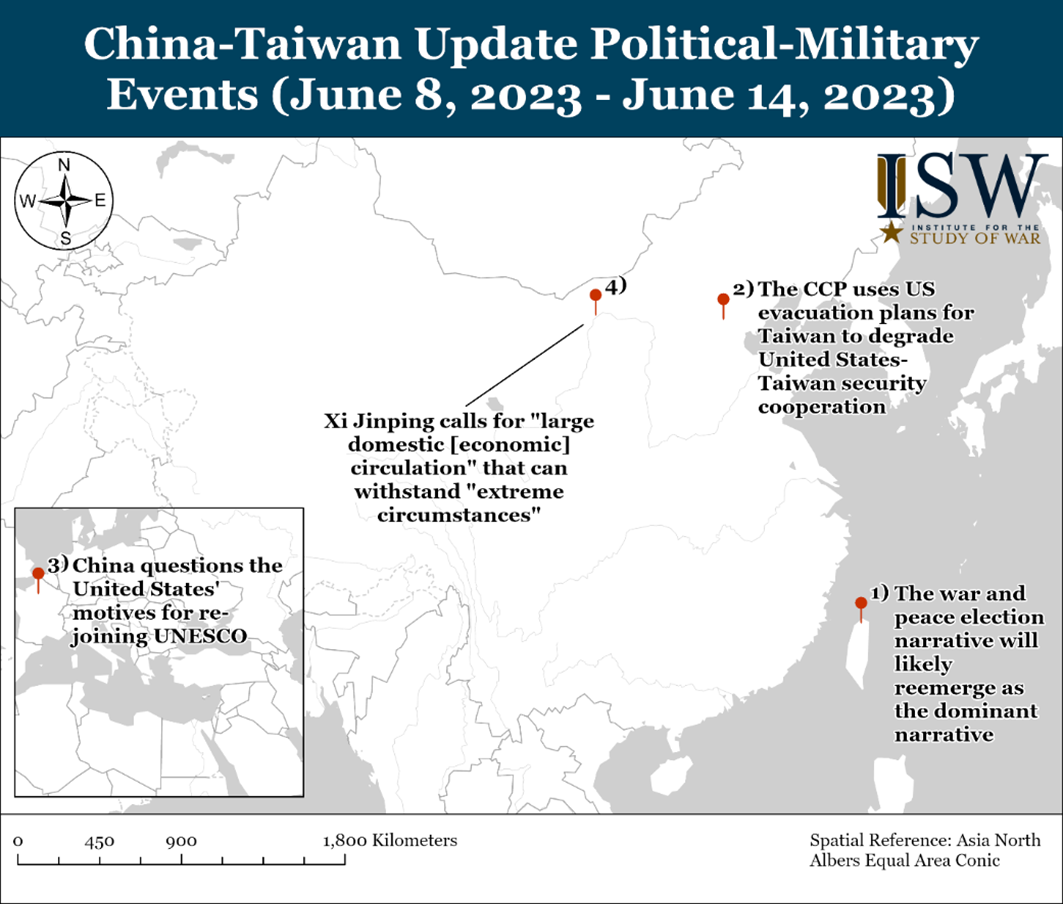 |
 |
China-Taiwan Weekly Update, June 16, 2023

China-Taiwan Weekly Update, June 16, 2023
Authors: Nils Peterson and Roy Eakin of the Institute for the Study of War
Editors: Dan Blumenthal and Frederick W. Kagan of the American Enterprise Institute
Data Cutoff: June 14, 2023, Noon ET
The China–Taiwan Weekly Update focuses on Chinese Communist Party paths to controlling Taiwan and relevant cross–Taiwan Strait developments.
Key Takeaways
- The narrative that the 2024 presidential election is a choice between peace and war is likely to reemerge as the dominant narrative in the mid to long term.
- The CCP used a recent report about US evacuation plans for Taiwan to advance information operations that aim to degrade United States-Taiwan security cooperation.
- China questioned the United States’ motives for re-joining the United Nations Educational, Scientific, and Cultural Organization (UNESCO) in a likely attempt to establish conditions to discredit US global leadership.
- CCP General Secretary Xi Jinping’s call for “large domestic [economic] circulation” that can withstand “extreme circumstances” is likely a long-term push to create a sanction-resistant Chinese economy while engaging with, but not becoming reliant upon, the international economic environment.
Taiwan Developments
This section covers relevant developments pertaining to Taiwan, including its upcoming January 13, 2024 presidential and legislative elections.
Elections
The Taiwanese (Republic of China) political spectrum is largely divided between the Democratic Progressive Party (DPP) and the Kuomintang (KMT). The DPP broadly favors Taiwanese autonomy, Taiwanese identity, and skepticism towards China. The KMT favors closer economic and cultural relations with China along with a broader alignment with a Chinese identity. The DPP under President Tsai Ing-wen has controlled the presidency and legislature (Legislative Yuan) since 2016. This presidential election cycle also includes the Taiwan People’s Party (TPP) candidate Ko Wen-je who frames his movement as an amorphous alternative to the DPP and KMT. It is normal for Taiwanese presidential elections to have third party candidates, but none have ever won. The 2024 Taiwan presidential and legislative elections will be held on January 13, 2024 and the new president will take office in May 2024. Presidential candidates can win elections with a plurality of votes in Taiwan.
The scandal surrounding the drugging of children at a Kid Castle Educational Institute in New Taipei will very likely shift the electoral narratives away from the DPP sexual assault scandals no longer than the short term. 17 parents filed police reports stating that the school illegally drugged their children with barbiturates. An unspecified number of children subsequently developed withdrawal symptoms.[1] KMT presidential candidate and New Taipei Mayor Hou Yu-ih subsequentially apologized for the scandal during media interviews.[2] This scandal and sexual assault allegations centered on the DPP have shifted media coverage away from the dominant but contested narrative in the Taiwanese information space that the 2024 Taiwanese presidential election is a choice between peace and war.[3] The Taiwanese media since May 31 has focused heavily on ongoing sexual assault scandals that center on the DPP.[4] Taiwan’s media coverage also has given priority to reporting on the Kid Castle Educational Institute since the scandal broke on June 8.[5]
Short-Term Electoral Narrative Impacts on Leading Presidential Candidates
|
Candidate (Party) |
Temporary Impact |
|
Hou Yu-ih (KMT) |
Harder to frame himself as a responsible alternative to the sexual harassment scandal-plagued DPP. |
|
Lai Ching-te (DPP) |
Reprieve from election media coverage focusing extensively on the sexual harassment scandals engulfing the party. |
|
Ko Wen-je (TPP) |
Easier to frame the TPP as a viable third-party alternative to pick up swing voters offput by KMT and DPP scandals. |
The narrative that the 2024 presidential election is a choice between peace and war is likely to reemerge as the dominant narrative in the mid to long term. The framing of the election as a choice between peace and war has been ongoing since at least January 2023 and continues to be a salient point within both Taiwanese and Chinese media outlets.[6] The sexual assault scandal was the dominant story in Taiwanese media from May 31 to June 8 and led to the DPP announcing systemic reforms.[7] Coverage is ongoing but its dominance in the media space lasted nine days from May 31 to June 8. The barbiturate scandal differs insofar as it is not directly linked to a political party. It instead affects only Hou because he is the New Taipei Mayor. The trend and importance of cross-strait relations to the Taiwanese electorate, along with the short-lived length of scandal coverage, suggests that cross-strait issues will be the central issue of the 2024 presidential election. The last two Taiwanese presidential elections, which occurred in 2016 and 2020, centered around the candidates’ differing views of cross-strait relations.[8] The 2024 presidential election coverage also focused on cross-strait relations until the sexual assault and drugging scandals.
The CCP used a recent report about US evacuation plans for Taiwan to advance information operations that aim to degrade United States-Taiwan security cooperation. The United States expanded US citizen evacuation plans to prepare for potential cross-strait conflicts, according to a report The Messenger published on June 12. Unspecified US officials relayed that they do not believe that a cross-strait conflict is imminent.[9] Chinese Foreign Ministry Spokesperson Wang Wenbin responded by accusing the United States of “using Taiwan as a pawn and the Taiwan people as cannon fodder to serve the US strategy of using Taiwan to contain China.”[10] Wang’s rhetoric implies that American security cooperation with Taiwan only hinders the Taiwanese people’s chances for a peaceful life devoid of cross-strait conflict. Breaking that security collaboration would be the prime way for the Taiwanese people to avoid becoming “cannon fodder” according to Wang’s reasoning.
China Developments
This section covers relevant developments pertaining to China and the governing Chinese Communist Party (CCP).
China questioned the United States’ motives for re-joining the United Nations Educational, Scientific, and Cultural Organization (UNESCO) in a likely attempt to establish the conditions for discrediting US global leadership. The United States messaged its intent to rejoin UNESCO on June 8, 2023, six and half years after leaving the organization.[11] UNESCO is responsible for matters that regard press freedom and the development of technological guidelines, including for artificial intelligence.[12] The Chinese Foreign Ministry responded by claiming that the United States’ exit from UNESCO “negatively impacted” the organization and accusing the United States of re-entering UNESCO to achieve the self-centered geopolitical aim of countering Chinese influence in international organizations.[13] This is similar to China’s reaction to the United States 2021 re-entry into the Paris Climate Agreement, where Chinese state-controlled media accused the United States of “betray[ing]” the agreement.[14] Chinese rhetoric in both cases frames the US participation in and leadership of international organizations as politicized and selfish to other member states.
CCP General Secretary Xi Jinping called for “large domestic [economic] circulation” that can withstand “extreme circumstances,” which is part of China’s long-term effort to create a sanction-resistant economy. Xi said that the “purpose of a large domestic [economic] cycle is to ensure the normal operation of the national economy under extreme circumstances” during a June 7 tour of Inner Mongolia.[15] “Domestic cycle” is one of the elements of the CCP’s “dual circulation” strategy, which involves the creation of a self-sustaining economy with links to international markets.[16] The strategy aims to leverage foreign investment and trade to bolster China’s economy without becoming reliant on international markets, thereby reducing the country’s vulnerabilities to sanctions during crises. Xi did not define “extreme circumstances.” This is not the first time “dual circulation” has been framed as a strategy that can protect the Chinese economy during “extreme circumstances.” A state-controlled Xinhua article used the same terminology to describe “dual circulation” in 2022.[17]
“Extreme circumstances” includes a potential Taiwan Strait conflict but is not limited to it. Statements from influential CCP economic figures like former Vice Premier Liu He suggest a connection between “dual circulation” and larger international economic trends. Liu previously said that international anti-globalization trends, supply chain challenges, and the need for China to adopt a new innovation-driven “development pattern” are all tied to “dual circulation.”[18] Xi’s statement reiterates his commitment an approach that will ideally re-orient the Chinese economy to adapt to several evolving circumstances rather than one Taiwan-centric scenario.
[1] https://www.taiwannews dot com.tw/en/news/4914406
[2] https://www.cna dot com.tw/news/aipl/202306080347.aspx
https://www.cna dot com.tw/news/aipl/202306085004.aspx
[3] https://understandingwar.org/backgrounder/china-taiwan-weekly-update-may...
[4] https://www.understandingwar.org/backgrounder/china%E2%80%93taiwan-weekl...
[5] https://news.ltn dot com.tw/news/politics/breakingnews/4328054 https://news.ltn dot com.tw/news/politics/breakingnews/4328054
https://news.ltn dot com.tw/news/politics/breakingnews/4332678
https://udn dot com/news/story/123545/7230091?from=udn-catelistnews_ch2
https://udn dot com/news/story/123545/7230801?from=udn-catebreaknews_ch2
https://udn dot com/news/story/123545/7230160?from=udn-catelistnews_ch2
[6] https://focustaiwan dot tw/politics/202301010007
https://understandingwar.org/backgrounder/china-taiwan-weekly-update-may...
http://www.news dot cn/tw/2023-06/14/c_1129694340.htm
[7] https://news.ltn dot com.tw/news/politics/breakingnews/4320660
https://news.ltn dot com.tw/news/politics/breakingnews/4320352
https://www.chinatimes dot com/newspapers/20230603000359-260118?chdtv
https://www.cna.com.tw/news/aipl/202306070263.aspx
[8] https://www.economist.com/banyan/2014/04/08/sunflower-sutra
https://db.cec dot gov.tw/ElecTable/Election/ElecTickets?dataType=tickets&typeId=ELC&subjectId=P0&legisId=00&themeId=61b4dda0ebac3332203ef3729a9a0ada&dataLevel=N&prvCode=00&cityCode=000&areaCode=00&deptCode=000&liCode=0000
https://international dot thenewslens.com/feature/taiwan2020/129435
[9] https://themessenger.com/news/the-u-s-is-preparing-evacuation-plans-for-...
[10] https://www.fmprc dot gov.cn/eng/xwfw_665399/s2510_665401/2511_665403/202306/t20230613_11095919.html
[11] https://www.wsj dot com/articles/u-s-moves-to-rejoin-unesco-to-counter-chinas-growing-sway-344eeb94
[12] https://www.wsj dot com/articles/u-s-moves-to-rejoin-unesco-to-counter-chinas-growing-sway-344eeb94
[13] https://www.fmprc dot gov.cn/eng/xwfw_665399/s2510_665401/2511_665403/202306/t20230613_11095919.html
[14] https://news.cctv dot com/2020/12/12/ARTIEB0MtYckINAPTQnlYjaq201212.shtml
[15] https://www.gov dot cn/yaowen/liebiao/202306/content_6885245.htm
[16] https://www.gov dot cn/guowuyuan/2020-11/25/content_5563986.htm
[17] http://www.news dot cn/politics/2022-04/25/c_1128595041.htm
[18] https://www.gov dot cn/guowuyuan/2020-11/25/content_5563986.htm
